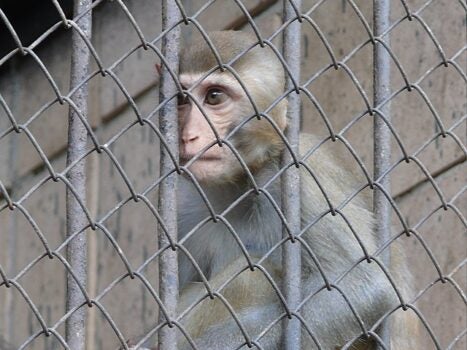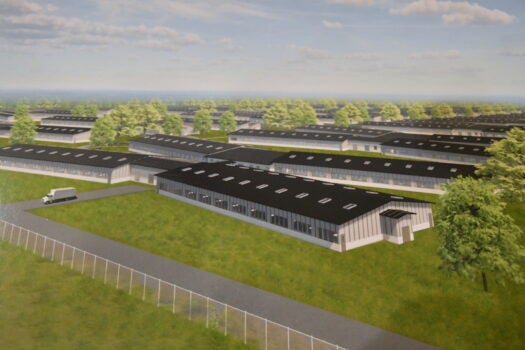No monkeying around: Residents and PETA raise concerns over planned primate facility
Published 9:56 am Wednesday, January 10, 2024
|
Getting your Trinity Audio player ready...
|
Members of the community were surprised to hear the news in December that a primate breeding facility will be built in Decatur County.
The facility is being set up by Safer Human Medicine (SHM), a recent start-up incorporated in Delaware, with business filings in Massachusetts and Pennsylvania, and a company that is just one piece in the complex animal testing industry.
Some residents believed the facility to be an animal testing lab; this is not the case. While the monkeys bred at the facility will be used in lab testing, they are only being bred at the facility. Both City Manager Chris Hobby and Development Authority Executive Director Rick McCaskill confirmed no testing is planned on site, only breeding. According to McCaskill, SHM has been in discussion about this facility, dubbed “Project Liberty”, for between 6-9 months. When complete, the project will bring roughly 263 jobs to the area. The city and county government voted last week to approve a 100% tax abatement for the facility’s first 10 years; after this 10-year period, the abatement would be reduced by 9% each year until fully taxable.
Who are Safer Human Medicine?
Both Hobby and McCaskill verified that, while Safer Human Medicine is a new company, it is staffed with people who have prior experience in this industry.
David Johst, president of Safer Human Medicine, previously served as executive vice president of Charles River Laboratories (CRL), a prominent name in breeding animals for testing. Johst retired from CRL in 2020, after almost 30 years with the company.
In an interview with the Post-Searchlight, Johst stated they had considered several locations for this facility before settling on Bainbridge. When asked about what drew the company to Bainbridge, Johst stated, “South Georgia has a lot of farming and a lot of agriculture. We thought that was important because it has a lot of people who are used to working around and understand the kind of work we’re doing with animals.” He also added that the facility would be purchasing and using local produce.
Johst is not the only member of the company with prior experience; Kurt Derfler is the COO of Safer Human Medicine, and also gained experience at Charles River Laboratories, having served as Executive Director of Primate Operations. Jim Harkness, the CEO, also has prior experience in the field, having previously worked as COO of Envigo, another business in the animal testing industry, now a subsidiary of Inotiv. Harkness would leave Envigo in October of 2022.
Where do they fit in the animal testing industry?
When asked where the initial batch of breeding primates would come from, Johst stated that they would be imported from outside the country, being delivered to the facility after undergoing an off-site CDC quarantine to minimize risk of disease.
“There really are no sources of primates… in the United States, that’s actually why we’re doing this,” Johst said. “They’re needed for research, so we want to help with that, by making sure they’re available for researchers, without having to rely only on overseas sources.”
Foreign sources of laboratory primates have become a controversial topic. Charles River Laboratories has recently experienced a shortage in their supply of primates, as has much of the testing industry; the company was subpoenaed by the DOJ on February 17, 2023, as part of an investigation into the illegal smuggling of macaques (a species of monkey) from Cambodia. As per reporting by Reuters and CBS News, the company’s stock price dropped after this was disclosed in an earnings call on February 22, and CRL stated they would voluntarily cease imports from Cambodia, and seek other means to fill in the gaps in the supply chain.
As for Envigo, which Harkness left in 2022, during his tenure the company’s beagle breeding facility in Cumberland, Virginia, was shut down. Our sister paper The Farmville Herald reported at the time on federal authorities seizing over 4,000 dogs from the facility, citing extreme cases of neglect and improper veterinary care. Dogs were reported as having open sores, some were severely dehydrated, and others were improperly euthanized. In response to the facility’s violations, the Virginia state legislature introduced a bill that would raise standards and penalties for animal welfare violations; according to reporting by the academic journal Science, Harkness and Envigo attempted to lobby against the bill, but it passed 98-0 in the Virginia House and 39-0 in the state Senate. After Harkness left in October of 2022, Envigo was subpoenaed by the Southern District of Florida one month later, for alleged involvement in Cambodian primate smuggling.
New companies respond
Within a month of Charles River announcing their subpoena, a new company, Kandurt LLC, was created. According to People for the Ethical Treatment of Animals (PETA), Kandurt LLC is a shell company for CRL, with its president being Shannon Parisotto, corporate executive vice president at Charles River. While it was incorporated in Delaware, the company set up in Texas, where it sought to build a primate breeding facility in Brazoria County, much like the one planned for Bainbridge. (After the initial publication of this article, Charles River Corporate Vice President Amy Cianciaruso reached out to the Post Searchlight by email, asserting that the proposed Texas facility will be a quarantine facility, rather than a breeding facility.) PETA discovered and reported on this. The Brazoria County Commissioner’s Court passed a unanimous resolution opposing the facility, and Republican Texas state representative Cody Thane Vasut even wrote a formal letter, also calling Kandurt a shell company and criticizing the project’s secrecy; this can be found on Vasut’s Facebook profile. Charles River COO Birgit Girshick recently stated that the company’s Texas plans are on hold.
Safer Human Medicine was also formed shortly after Charles River’s subpoena announcement; according to official records and filings, while their Boston office was set up in June, it was initially incorporated in Delaware on February 24, one week after the February subpoena, two days after the earnings call, and barely two weeks prior to Kandurt LLC’s formation on March 8.
Johst stated he had heard about the planned Texas facility, but stated that it was CRL’s company, and reiterated his separation with the company. He also stated that there was a team at Safer Human Medicine that would properly vet the imported animals, both for disease and to ensure they were properly acquired.
When asked about the planned Texas facility and Kandurt LLC, Rick McCaskill said he had no awareness of it. “I’m not saying it’s true, I’m not saying it’s not true, but I can tell you this, PETA’s gonna spin up that kind of stuff about this one here too,” he said.
Chris Hobby stated that while he was unaware of the Texas facility or any ongoing connection between Safer Human Medicine and Charles River, they were aware of the Cambodian smuggling situation, saying, “Charles River and some of these other companies in the US that were importing these animals, even though they may not have been complicit in the smuggling operation, they had, even if unwittingly, had participated in it. That is I think one of the reasons why there’s a push to onshore this activity.”
PETA’s response
In an interview with the Post-Searchlight, Dr. Lisa Jones-Engel, Senior Science Advisor on Primate Experimentation with PETA, responded to McCaskill’s statement, saying, “We’ll simply give the community, who is going to be the ones who bear the consequences of this facility, we’ll give them the information. The information that Kandurt and Safer Human Medicine have failed to provide.”
She also criticized Johst, Harkness and Derfler’s prior involvement with Envigo and CRL, describing it as a “sordid history of overseeing companies who are currently under investigation by the U.S. Department of Justice (DOJ), the U.S. Fish & Wildlife Service, and the U.S. Securities and Exchange Commission related to the alleged illegal smuggling of long-tailed macaques, an endangered species, to sell to U.S. laboratories.”
Dr. Jones-Engel, a former lab researcher with prior experience in primate research before joining PETA, also brought up concerns over animal welfare, such as the Envigo scandal. “For years, these individuals have been in leadership positions at facilities that have repeatedly been charged with violating even the most basic federal animal welfare regulations,” she said.
McCaskill expressed confidence in the project, saying, “We are very comfortable with this company, because they want to be the one that comes in and does it right. I don’t know anything about their past, but I know they know what they’re doing, and I see what they’re doing… With their clientele that they’re going to be selling these things to, it’s to their advantage to do everything by the book, squeaky clean.”
“We formed Safer Human Medicine with one purpose in mind, and that was to make sure medical research in the US is not gonna slow down because scientists and researchers in our country don’t have access to non-human primates,” Johst said. “This actually gives the city of Bainbridge, and Decatur County, an influence on research.” He also stated that the enclosures would be designed to meet US Department of Agriculture standards, and that animal welfare is “top of the list for us.”
Construction is scheduled to begin in February, and will progress in phases.
Escapes, Diseases: What’s the Risk?
Concerns have been raised by some over the possibility of animals escaping the facility, with the potential for spreading disease to humans and possible ecological damage. And not without cause; according to the University of Florida’s records, in the 1970s, Charles River Laboratories introduced rhesus macaques onto two islands in the Florida Keys. These breeding troops destroyed the island’s native mangrove trees, which in turn led to increased erosion, and media coverage at the time stated their fecal matter also contaminated the water. This operation ultimately ended with the primates being removed from the islands between 1999 and 2000. Another invasive population of macaques was deliberately introduced to Florida by a boat captain in the 1930s; these monkeys not only feed on local wildlife (such as bird eggs), but also raid crops, and even carry the herpes B virus, which is highly fatal when transmitted to humans, though there is no report of a human contracting it from a wild macaque.
In letters sent by PETA to city council members and county commissioners, Jones-Engel discussed the risk of the monkey’s waste contaminating the soil and water, and cited multiple instances of primates escaping “the most secure level of laboratories”, including four baboons escaping from the Texas Biomedical Research Institute in 2018, and a macaque escaping from Emory University’s primate research facility in 2011, among other examples.
When talking with the Post-Searchlight, Johst stated that the enclosures are designed to meet US Department of Agriculture standards: “We design the enclosure where we keep the non-human primates that are put under our care to make them feel safe, and make them feel comfortable, but also to prevent escape.” He emphasized the facility’s security precautions against escape, saying, “We put multiple barriers up to ensure they couldn’t somehow find a way to escape and get into unfamiliar surroundings.” He clarified that the facility will use a double-entry security door system to prevent escape; this system, he explained, consisted of two doors, with each one only able to open after the previous one has closed. He also stated that the primate’s enclosure would have access to outside air and natural light.
Jones-Engel emphasized the risk of disease the primates could pose. “It’s of grave concern that this newly incorporated company, Safer Human Medicines, is preparing to bring 30,000 monkeys to Bainbridge, particularly as the proposed facility is near the Flint River and ecologically and agriculturally sensitive land,” she said.
City and company officials have both expressed confidence in the facility’s quarantine procedures and containment capabilities. Johst declined to comment further about PETA’s statements.







